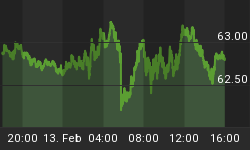Here's the good news. In the third quarter, the market value of households' assets increased by 2.7%. Here's the bad news, the value of households' liabilities increased by 3.0%. So, the leverage of households moved up to 18.24% in the third quarter from 18.19% in the second quarter (see Chart 1). The third quarter household leverage ratio is the highest since the record high of 18.32% set in the first quarter of 2003.
Chart 1
A lot of the increased household indebtedness resulted from home"owners?" tapping the equity in their houses. At an annual rate, households withdrew from their personal "home ATMs" a net $452.3 billion (see Chart 2). This, of course, was the principal reason households were able to consume and pay principal and interest on non- mortgage debt by an annualized record amount of a $132.9 billion in excess of what they earned after taxes.
Chart 2
Speaking of paying principal and interest on debt, households devoted a record 13.75% of their after-tax income to servicing their total debt, including mortgage debt (see Chart 3). With some analysts estimating that $2-1/2 trillion of household debt will be repriced upward next year because of the increase in interest rates, the household debt-service ratio is bound to climb to new highs.
Chart 3
Here's some more good news. As shown in Chart 4, household net worth in relation to after-tax income continues to rebound, reaching 565% -- almost back to its percentage at the end of 2000.
Chart 4
There are two ways that households can increase their net worth: (1) spend less than they earn after taxes or (2) be fortunate to own an asset that is rising in value. Well, we know number one has not been the way households have been increasing their net worth of late. As Chart 5 shows, in the past three years, holding gains on previously-purchased assets has been the main driver of increases in household net worth. And, in the second and third quarters of this year, holding gains on assets accounted for more than 100% of increases in household net worth. And, as implied by Chart 6, holding gains on residential real estate has played a large role in accounting for the gains in household net worth. To be specific, since 2003:Q1, holding gains on residential real estate on average has accounted for 70% of the gains in household net worth. The median increase in real estate holding gains relative to increases in net worth has been 42%.
Chart 5
Chart 6
Now comes the bad news. This same runup in the market value of residential real estate that has fueled a large part of the increase in households' net worth has also been responsible for the decline in housing affordability to its lowest level since 1991. That is, the market value of residential real estate has risen to a record level relative to after-tax household income. Or, as shown in Chart 7, disposable personal income has fallen to a record low level relative to the market value of residential real estate, which has caused housing affordability to plunge.
Chart 7
With housing affordability plunging, holding gains on residential real estate are likely to moderate. Unless there is one heck of a rise in corporate equity prices to compensate for the milder increases in home prices, households might actually start to live within their income means again if they want to keep increasing their net worth. This is why I am bearish on consumer discretionary spending in the coming years.
















